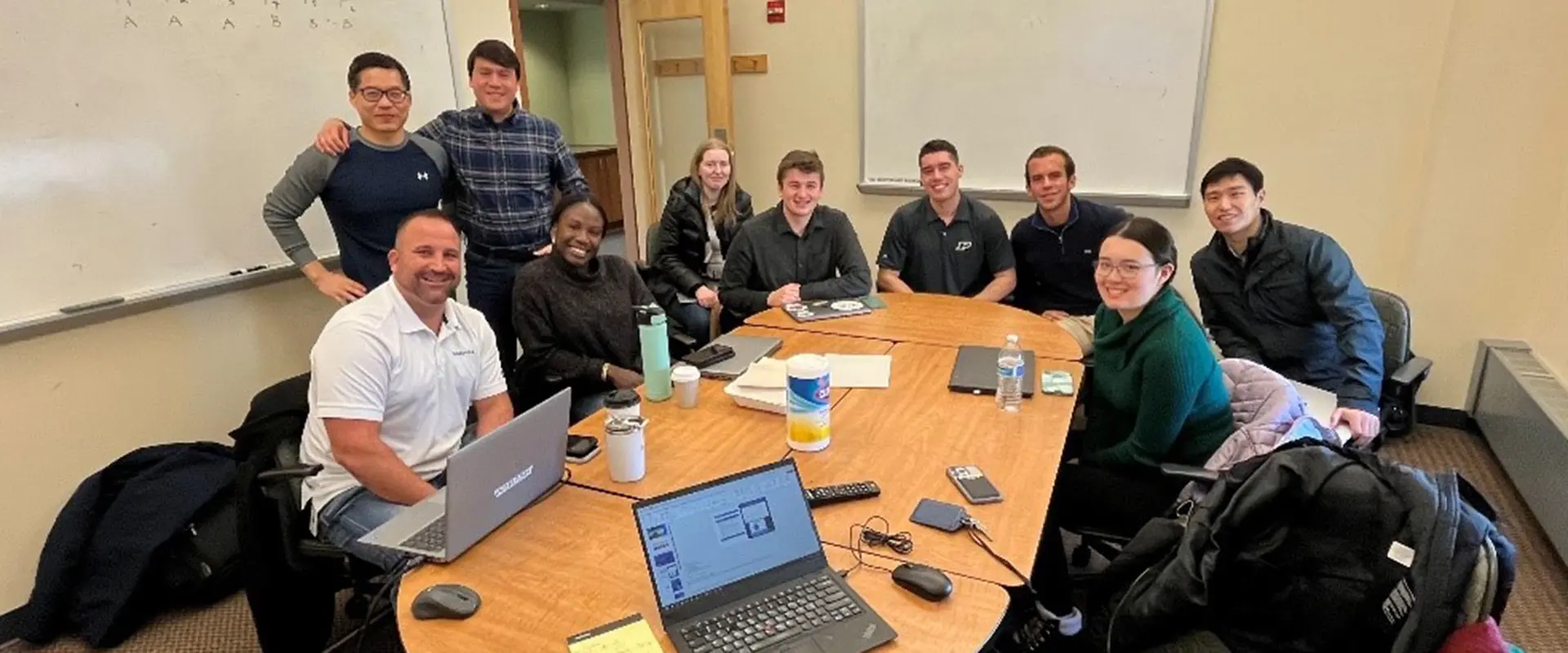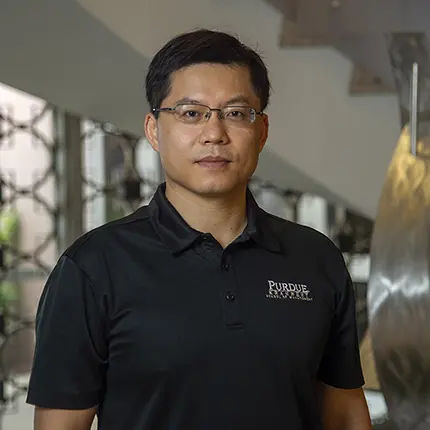
Experiential learning is at the heart of the Daniels School’s mission to provide a transformative education, and alumni-driven corporate partnerships are key components in helping students builds their skills outside the traditional classroom.
To this end, seasoned supply chain professionals and recent graduates are fostering these relationships in a course for undergraduates, Strategic Sourcing and Procurement (MGMT 46501). The course is led by Zhan Pang, the school’s Lewis B. Cullman Rising Star Professor of Management.
Pang developed the course with support from a supply chain alumni advisory committee that includes Jeff Powers (BSIM '79), a retired IBM executive; Don MacKay (BSIM ’75), a retired Sears executive; Mary Slater (BS ’03, MBA ’05), business excellence manager for Shell TechWorks; Dave Stowe (BSIM ’89), a partner at Adventus Innovate Consulting; Nilo Cedeno (MBA ’22), a senior sourcing specialist at Wabash; Coumba Niang (MSGSCM ’21), a direct sourcing specialist at Wabash; Nick Rosso (BS ’21), a senior supply chain associate at Eli Lilly; and Logan Barr (BS ’20), a business unit manager at PepsiCo.

The alumni were introduced to Pang through his work with the Boilermaker Consulting Group, which was formed during the pandemic to give students the opportunity to apply their skills to real-world business challenges. “We brought him in as an advisor because we had so many supply chain projects and he already knew the value of experiential learning,” Slater says. “The foundation was there, so it was mostly a matter of leveraging it for a specific course.”
Using his and the board’s industry contacts, Pang forged corporate partnerships with Corteva, Dow Chemical, Wabash and Rolls Royce, among others, offering students unique opportunities to combine classroom and experiential learning to solve real-world supply chain problems under the collaborative guidance of the instructor and corporate advisors.
“Understanding and mastering the principles and methodologies in supply chain management requires direct experiences in real-world business operations,” Pang says. “We could always find Boilermakers in these organizations to work with us on projects to solve challenges and train future talent.”
At Corteva, the project was facilitated by North American Logistics Leader Joshua Merrill (BS ’01), while Project Manager Patryk Baranski (BS ’22) took the lead at Rolls Royce. At Wabash, the projects were led by alumni board members Cedeno and Niang, both former students of Pang's. “From signing the NDAs and identifying the internal project sponsors to recruiting and advising students and collecting feedback on our students’ performance throughout the project, these alumni were always key and reliable contact points,” he says. “Their interactions with students and advice on the design of experiential learning programs have been invaluable.”
The student teams also benefitted from alumni support at the top of the organization. “Academic and industry partnerships bring together the best of industry-specific and cutting-edge business knowledge to craft new and innovative ideas,” says Mike Pettit (BSIM ’97), senior vice president and chief financial officer at Wabash. “We very much believe in attacking challenging problems using an ecosystem and Purdue is a vital part of that ecosystem.”
The Daniels School’s undergraduate and graduate production/operations and supply chain/logistics programs are both ranked in the Top 10 by U.S. News & World Report.
“These collaborations drive innovation by enabling joint research initiatives that address specific industry challenges, leading to new technologies and optimized sourcing strategies,” adds Cedeno. “They also ensure curriculum relevance by aligning educational programs with industry needs, incorporating the latest trends and practices and better-preparing students for the complexities of modern supply chains.”
As a recent alum, Niang found it refreshing to work with students again. “Purdue students bring innovative tools to the table, and with the guidance of Wabash leaders, they develop professional solutions,” she says. “Those students who invest significant time and effort, especially those without prior work experience, gain a deeper understanding of team effort, which is crucial in a collaborative labor environment.”
The students contributed to several supply chain solutions across key categories at Wabash. In direct sourcing, they analyzed the use of flooring in its trailers and enhanced forecasting accuracy, which enabled better inventory management and cost control. They also created a regression model to explain what drives wood pricing. For indirect sourcing, students worked on supplier selection projects, ensuring the best value and reliability by developing product/service categories, pricing trends, supplier evaluations and proximity analysis between suppliers and Wabash facilities. In logistics, they developed strategies to identify external suppliers that are causing delays and proposed strategies to optimize times in deliveries, improving on-time performance and overall supply chain reliability.
“This partnership has yielded significant positive impacts for both the company and the students,” Cedeno says. “For the company, the innovative solutions and fresh perspectives brought by the students have led to improvements in supply chain efficiency and enhanced operational capabilities, as well as talent acquisition. For the students, the experience provided an invaluable opportunity to apply theoretical knowledge in real-world scenarios, enhancing their problem-solving skills and preparing them for successful careers in supply chain management.”
It's also had benefits on a personal and professional level, adds Niang. “It’s rewarding to give back to the college that has helped you professionally and to provide students with the opportunity to work on real-life projects,” she says. “It gives them a first-person perspective of the supply chain industry and how can they use their degree to choose the path they want to take in the future.”
“Academic and industry partnerships bring together the best of industry-specific and cutting-edge business knowledge to craft new and innovative ideas.” — Mike Pettit (BSIM ’97), Senior Vice President and Chief Financial Officer, Wabash
That approach has already resulted in internship and job opportunities for students. Grace Lowe (BS ’23), for example, took the course and worked on a Wabash project as a junior, which led her to the company’s summer internship program. She was then asked to stay on part-time during her senior year and was offered a full-time role upon graduation as part of the company’s Early Leadership Development Program, a three-year rotational program Wabash provides to new hires.
“Because of the course project, I was able to make great connections with members of the Wabash procurement team, so they knew who I was and how I worked with them,” Lowe says. “The experience helped me to build my network and to establish a great start to my career.”
It’s those type of outcomes that Pang envisioned when he and the alumni board designed the course, which he hopes to expand to include more industry partners and a wider variety of projects. “Like any experiential learning course, it’s a work in progress,” he says. “We have the confidence and resources to make it progressively better. With the joint efforts of faculty, alumni and corporate partners, we’re building a transformative supply chain education that can be scaled to include other academic programs ”
Slater shares that perspective, and encourages other alumni to engage with students directly by sharing their career expertise, developing case studies and offering experiential projects like those in Pang’s course. “There are numerous ways that alumni can help students build the skills they need for meaningful careers,” she says. “The shared goal is to help them extend their learning from the classroom into the real-word, which is at the heart of a Daniels School education.”